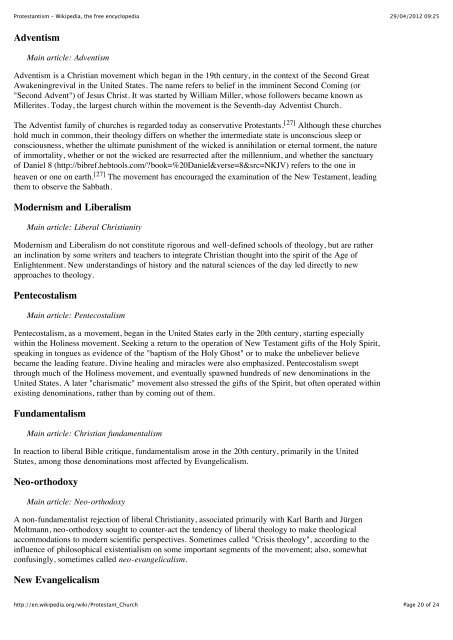Protestantism - Wikipedia, the free encyclopedia
Protestantism - Wikipedia, the free encyclopedia
Protestantism - Wikipedia, the free encyclopedia
Create successful ePaper yourself
Turn your PDF publications into a flip-book with our unique Google optimized e-Paper software.
<strong>Protestantism</strong> - <strong>Wikipedia</strong>, <strong>the</strong> <strong>free</strong> <strong>encyclopedia</strong><br />
Adventism<br />
Main article: Adventism<br />
Adventism is a Christian movement which began in <strong>the</strong> 19th century, in <strong>the</strong> context of <strong>the</strong> Second Great<br />
Awakeningrevival in <strong>the</strong> United States. The name refers to belief in <strong>the</strong> imminent Second Coming (or<br />
"Second Advent") of Jesus Christ. It was started by William Miller, whose followers became known as<br />
Millerites. Today, <strong>the</strong> largest church within <strong>the</strong> movement is <strong>the</strong> Seventh-day Adventist Church.<br />
The Adventist family of churches is regarded today as conservative Protestants. [27] Although <strong>the</strong>se churches<br />
hold much in common, <strong>the</strong>ir <strong>the</strong>ology differs on whe<strong>the</strong>r <strong>the</strong> intermediate state is unconscious sleep or<br />
consciousness, whe<strong>the</strong>r <strong>the</strong> ultimate punishment of <strong>the</strong> wicked is annihilation or eternal torment, <strong>the</strong> nature<br />
of immortality, whe<strong>the</strong>r or not <strong>the</strong> wicked are resurrected after <strong>the</strong> millennium, and whe<strong>the</strong>r <strong>the</strong> sanctuary<br />
of Daniel 8 (http://bibref.hebtools.com/?book=%20Daniel&verse=8&src=NKJV) refers to <strong>the</strong> one in<br />
heaven or one on earth. [27] The movement has encouraged <strong>the</strong> examination of <strong>the</strong> New Testament, leading<br />
<strong>the</strong>m to observe <strong>the</strong> Sabbath.<br />
Modernism and Liberalism<br />
Main article: Liberal Christianity<br />
Modernism and Liberalism do not constitute rigorous and well-defined schools of <strong>the</strong>ology, but are ra<strong>the</strong>r<br />
an inclination by some writers and teachers to integrate Christian thought into <strong>the</strong> spirit of <strong>the</strong> Age of<br />
Enlightenment. New understandings of history and <strong>the</strong> natural sciences of <strong>the</strong> day led directly to new<br />
approaches to <strong>the</strong>ology.<br />
Pentecostalism<br />
Main article: Pentecostalism<br />
Pentecostalism, as a movement, began in <strong>the</strong> United States early in <strong>the</strong> 20th century, starting especially<br />
within <strong>the</strong> Holiness movement. Seeking a return to <strong>the</strong> operation of New Testament gifts of <strong>the</strong> Holy Spirit,<br />
speaking in tongues as evidence of <strong>the</strong> "baptism of <strong>the</strong> Holy Ghost" or to make <strong>the</strong> unbeliever believe<br />
became <strong>the</strong> leading feature. Divine healing and miracles were also emphasized. Pentecostalism swept<br />
through much of <strong>the</strong> Holiness movement, and eventually spawned hundreds of new denominations in <strong>the</strong><br />
United States. A later "charismatic" movement also stressed <strong>the</strong> gifts of <strong>the</strong> Spirit, but often operated within<br />
existing denominations, ra<strong>the</strong>r than by coming out of <strong>the</strong>m.<br />
Fundamentalism<br />
Main article: Christian fundamentalism<br />
In reaction to liberal Bible critique, fundamentalism arose in <strong>the</strong> 20th century, primarily in <strong>the</strong> United<br />
States, among those denominations most affected by Evangelicalism.<br />
Neo-orthodoxy<br />
Main article: Neo-orthodoxy<br />
A non-fundamentalist rejection of liberal Christianity, associated primarily with Karl Barth and Jürgen<br />
Moltmann, neo-orthodoxy sought to counter-act <strong>the</strong> tendency of liberal <strong>the</strong>ology to make <strong>the</strong>ological<br />
accommodations to modern scientific perspectives. Sometimes called "Crisis <strong>the</strong>ology", according to <strong>the</strong><br />
influence of philosophical existentialism on some important segments of <strong>the</strong> movement; also, somewhat<br />
confusingly, sometimes called neo-evangelicalism.<br />
New Evangelicalism<br />
http://en.wikipedia.org/wiki/Protestant_Church<br />
29/04/2012 09:25<br />
Page 20 of 24


